"Telecommunication over Decades" Special Exhibition
Home in the Past
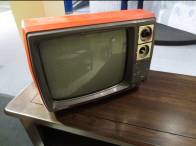
In the 80's, more and more tall buildings started to appear in Macao. However, most families still chose to live in their original places. Most households had already installed fixed line telephone, which made it much more convenient for daily communication. Can you see the records at the corner of this house? Just play it on the record player and hear what it says. Of course, you may dial the telephone and look up the directory beside it. At that time, people in Macao could already make long distance calls conveniently at home. The telephone bills on the coffee table shows some information about long distance calls in those days. You may also learn about the daily news from the old newspaper on the table. Television was a must-have item for almost every household in the 80's. Is it showing the video about the launch of television broadcasting service by TDM in 1984?
Residential Telephone
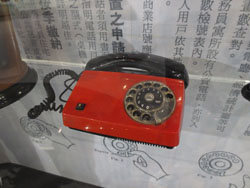
In the 70's, there was a large influx of overseas Chinese and immigrants from mainland China. The rapid growth of population and economic development created a great demand for telephone service by the general public. At that time, CTT had extended the automatic telephone exchange system, and the telephone lines within Macao were increased to 2,000. In Taipa and Coloane, 600 new telephone lines were also in service. Since 1978, telephone application had changed to contract-based, and usage became unlimited. In 1981, the Macao government approved the telecommunications monopoly service in order to speed up the network expansion and technology innovation. Since then, telephone has become an indispensable tool of communication for the citizens.
Telephone Bill
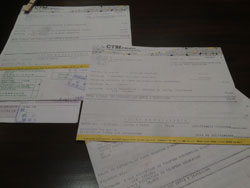
International Direct Dialing (IDD) service in Macao started in the 80's. Since then, international calls connected by operators became history. Although most long distance calls still had to be transferred by Hong Kong to the destination, international direct dialing from Macao to other countries was soon in service. As the technology development cost decreased, the fees for long distance calls also reduced. IDD became an essential function of telephone.
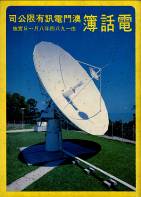
Before the 80's, international calls had to be connected manually. Hence, delay was unavoidable during the operation. In addition to the call charge, the user also had to pay for the line connection fee. Therefore, international calls were expensive. In August 1982, the International Direct Dialing (IDD) service to Hong Kong was launched in Macao. Although long distance calls could be made to over 100 countries and districts, it still had to call Hong Kong first, and then had the call transferred to the destination through the satellite antenna in Hong Kong.
In mid 1984, the first satellite antenna installed in Coloane was in operation. Since then, Macao was directly connected to the outside world. When we dialed international calls, we used 01 for Hong Kong and 00 for other countries. In 1984, IDD calls to Hong Kong was charged at MOP6.00~12.00 for the first 3 minutes, Portugal at MOP54.00~72.00, Beijing at MOP36.00~60.00, Guangzhou at MOP8.40~ 14.00, Taiwan at MOP36.00~48.00. The charges were much lower compared to the 60's. At that time, the monthly salary of a clerk at the bank was MOP2,000.00. In 1990, IDD usage was increased to 20,000,000 calls.
Record Player - Macao in the 80's
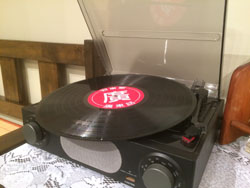
Since free television broadcast commenced in Hong Kong in 1967, Macao people also adopted the new hobby of going to the cafés to watch TV. After school, the children would bring their own stools to the neighbor's homes to watch their favorite TV programs, "wrestling" and "superman". In the 70's, the rooftop of houses and buildings were occupied by the "fishbone" shaped antennas for TV signal reception. Every night at dinner time, eating while watching TV became a habit of most families.
The population of Macao increased from about 250,000 in the 70's to about 300,000 in the mid 80's. Apart from the overseas Chinese, the growing population came from the immigrants from mainland China. At that time, although the younger generation of Macao had more chances of regular education, employment opportunities were still limited as Macao was still not well developed economically. Most people started their career in the garment and toys manufacturing industries which were most prosperous at that time. With their savings, they would buy electrical appliances to send home.
From the 70's to 80's, people's apartments were not too much different from those nowadays. However, material life was not as rich. Most families had TV at home only after the 70's. In mid 1984, TDM commenced TV broadcasting. Since then, Macao had her own TV station to broadcast the Grand Prix every year. Apart from this, every family also had the new and popular household item - telephone. Although it was not easy to apply for a telephone, people started to have it at home so that they did not have to go all the way to CTT to make long distance calls. They could stay home and make international direct calls to their families and friends living abroad. The telephone bill on the coffee table shows that telephone charges are actually quite high. People normally would make IDD calls only on festivals.
About CMM
Contact US
Others
Other Websites
Number of Visitors:
Last Modified Date: 10/03/2025